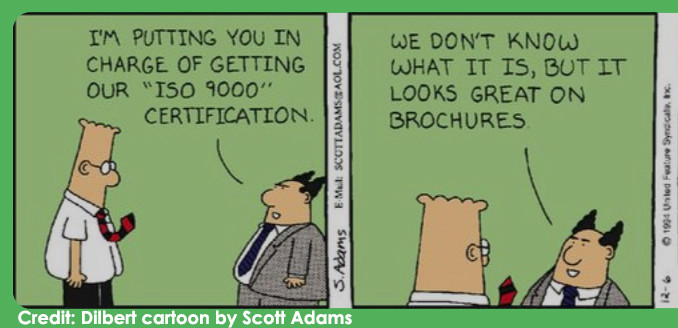What is ISO 9001? 2023 Update
ISO 9001 vs ISO 9000
An increasing number of people are asking about the meaning of ISO 9001 vs ISO 9000. This could be Dilbert’s fault.

ISO 9001 Specifies Requirements
ISO 9001 and ISO 9000 are two distinct standards within the ISO 9000 family, both of which pertain to the topic of quality management. While they are related, there are notable differences between the two.
ISO 9001 is a standard that provides specific requirements for a Quality Management System (QMS). It sets out the criteria that an organization must meet to be certified as having a robust and effective QMS. ISO 9001 specifies requirements for various aspects of the QMS, including management responsibility, resource management, product realization, measurement, analysis, and improvement.
ISO 9000 Provides an Overview of the Fundamentals
On the other hand, ISO 9000 is a family of standards that includes several different documents, one of which is ISO 9001. ISO 9000 provides an overview of the fundamentals of quality management systems and explains the concepts and terminology used within the ISO 9000 family of standards. It provides guidance on the selection and use of the appropriate ISO 9000 standard for a particular organization, depending on its specific needs and objectives.
So, while ISO 9001 provides specific requirements for a QMS, ISO 9000 provides an overview of the fundamentals of quality management systems and guidance on the selection and use of the appropriate ISO 9000 standard for a particular organization.
| What is ISO 9001? | What is ISO 9000? |
|---|---|
| Contains requirements | Contains principles and definitions |
| Businesses choose to get certified to it | Businesses can’t get certified to it |
| Companies can claim conformance | Companies do not claim conformance |
| Helps companies achieve ongoing improvement | Helps companies understand ISO 9001 |
| Provides globally accepted minimum processes | Provides globally accepted definitions |
The ISO 9001 Standard QMS
What is a Quality Management System?
A Quality Management System (QMS) is a set of policies, procedures, and processes that are designed to ensure that an organization consistently produces products or services that meet or exceed customer requirements and expectations. The goal of a QMS is to improve customer satisfaction by identifying and addressing the root causes of quality issues and to continuously improve the organization’s ability to deliver high-quality products and services.

QMS Focused
At its core, an ISO 9001 QMS is focused on managing and improving the processes that are involved in producing a product or service. This includes everything from design and development to production, delivery, and post-sales support. A QMS provides a framework for managing these processes in a systematic and standardized way so that quality issues can be identified and addressed quickly and efficiently.
QMS Objectives and Procedures
A QMS typically includes several key elements, including quality policy and objectives, procedures for identifying and addressing customer requirements, procedures for managing product and process design, procedures for managing suppliers and partners, and procedures for managing quality-related data and documentation. It may also include specific tools and techniques for measuring and analyzing quality-related data, such as statistical process control or Six Sigma methodologies.
Continuous Improvement
One of the most important aspects of a QMS is its focus on continuous improvement. By continually monitoring and analyzing quality-related data, an organization can identify areas where improvements can be made and implement changes to improve quality and efficiency. This may involve making changes to processes, procedures, or products themselves, or it may involve investing in new technology or training programs to improve the skills of employees.
QMS Implementation Advantages
Ultimately, a well-designed and well-implemented QMS can help an organization to achieve several important business objectives. It can improve customer satisfaction and loyalty, reduce costs associated with rework and warranty claims, increase efficiency and productivity, and improve the organization’s reputation and competitiveness. By taking a systematic and data-driven approach to quality management, organizations can ensure that they are delivering high-quality products and services that meet the needs of their customers and stakeholders.
For each process in your QMS, there are rules in the standard that you must follow.
Quality Management System Requirements:
-
Defining, controlling, and improving the processes within your company
-
Establishing the role of leadership
-
Planning expected results and changes
-
Identifying and addressing risks and opportunities
-
Managing all resources (equipment, tools, employees)
-
Establishing documented information (procedures, work instructions, drawings, records, etc.)
-
Monitoring the system (measuring, auditing, reviewing, etc.)
-
Finding and fixing problems and their causes
-
Improving all processes
Determining the Scope of Your QMS
One of the key requirements of complying with the ISO 9001 Standard is to determine the scope of your QMS, which is outlined in section 4.3 of the standard.
To determine the scope of your QMS, you must identify which processes, product lines, or services are included in your QMS. This requires a careful evaluation of your organization’s activities, products, and services, to determine which ones are relevant to your quality management system.

Once you have determined the boundaries of your QMS, you must then identify which ISO 9001 requirements apply to your company. This involves going through the requirements one by one, to understand what is required and how it applies to your company.
Your QMS Must be Continuously Monitored
It is important to note that complying with ISO 9001 is not a one-time activity. Your QMS must be continuously monitored and improved to ensure ongoing compliance with the standard. This means that you must regularly review and update your QMS to ensure that it remains relevant and effective.
Determining the scope of your QMS is a critical step in complying with ISO 9001. It requires a thorough evaluation of your organization’s activities, products, and services, and an understanding of the requirements of the standard. By carefully defining the scope of your QMS and ensuring ongoing compliance, you can demonstrate your commitment to quality and customer satisfaction.
Implementing ISO 9001
To fully grasp the scope and intricacy of embarking on an ISO9001 implementation project, it’s crucial to acknowledge that a large number of requirements must be met and outlined in a comprehensive document. With the number of requirements and the high expectations for their fulfillment, it’s understandable to feel overwhelmed. However, Core Business Solutions with expert consultants and internal auditors can turn an otherwise worrisome task into a stress-free accomplishment.

Core Business Solutions itself holds ISO 9001 certification and has an established track record of success in assisting hundreds of clients in achieving their certification goals each year through their tried, tested, and refined program.
With Core Business Solutions, ISO 9001 Consulting Is affordable. Each client chooses between 4 levels of support based on their budget. All you need is one person, or a few individuals, who are assigned to get it done!
What is the Cost of ISO 9001 Certification?
The cost of ISO 9001 certification with Core Business Solutions, Inc. varies depending on the size and complexity of the organization. However, we offer a transparent pricing structure that is based on the number of employees in the organization. It costs between $5,700 and $15,000 to prepare and between $3,000 and $5,000 to certify, depending on the company size and how much prep time you choose to take.
In addition to the cost of certification, there are other costs associated with achieving ISO 9001 certification. These may include the cost of training employees in the requirements of the standard and the cost of conducting internal audits to ensure compliance with the standard. However, the benefits of ISO 9001 certification often outweigh the costs. ISO 9001 certification can help organizations improve their operations, reduce costs, increase customer satisfaction, and enhance their reputation.
What is the difference between ISO 9001 Certification and Claiming Conformance?
Certification
Certification is a formal process in which an independent third-party organization assesses a company’s quality management system against the requirements of ISO 9001 and includes a formal audit from a Certified Body. If the company’s QMS meets all the requirements of the standard, the organization will issue a certificate of conformity, which is a formal recognition that the company’s QMS meets the requirements of ISO 9001.

Conformance
On the other hand, claiming conformance means that a company has evaluated its own QMS against the requirements of ISO 9001 and has concluded that it meets those requirements. The company may choose to publicly state that it has conformed to the standard, but this is not the same as being certified.
While claiming conformance can be a useful way for companies to demonstrate their commitment to quality and their customers, it is not as rigorous as the certification process. Certification involves a comprehensive and independent assessment by a third-party organization, which provides greater assurance to customers and other stakeholders that the company’s QMS meets the requirements of ISO 9001.
Certification provides a more formal and rigorous recognition that a company’s QMS meets the requirements of ISO 9001 while claiming conformance is a self-assessment that can be a useful way for companies to demonstrate their commitment to quality.
ISO 9001 Consultants
ISO 9001 is a standard filled with requirements about controlling your business processes and the quality of your products and services. Its companion, ISO 9000, was written to help users of ISO 9001 understand basic principles and terms related to quality.
Though learning and implementing the requirements can be seen as a daunting task, there are consulting firms, like us, to help guide you in your project.

You do not have to “reinvent the wheel” all by yourself because we can make the project a smooth and effective experience.



